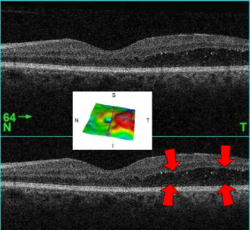Macular edema

Editor-In-Chief: Prab R Tumpati, MD
Obesity, Sleep & Internal medicine
Founder, WikiMD Wellnesspedia &
W8MD's medical weight loss NYC, sleep center NYC
Philadelphia medical weight loss and Philadelphia sleep clinics
| Macular edema | |
|---|---|

| |
| Synonyms | N/A |
| Pronounce | N/A |
| Specialty | N/A |
| Symptoms | Blurred vision, distorted vision, color perception changes |
| Complications | Vision loss, retinal detachment |
| Onset | Gradual |
| Duration | Variable |
| Types | N/A |
| Causes | Diabetic retinopathy, retinal vein occlusion, inflammatory eye diseases |
| Risks | Diabetes mellitus, hypertension, age-related macular degeneration |
| Diagnosis | Optical coherence tomography, fluorescein angiography |
| Differential diagnosis | Macular degeneration, retinal detachment, central serous retinopathy |
| Prevention | N/A |
| Treatment | Anti-VEGF therapy, corticosteroids, laser photocoagulation |
| Medication | N/A |
| Prognosis | Variable, depending on underlying cause and treatment |
| Frequency | Common in individuals with diabetes |
| Deaths | N/A |

Macular Edema is a medical condition characterized by the swelling or thickening of the macula, the part of the retina responsible for detailed, central vision. This condition is often associated with various diseases, most commonly diabetes, but can also occur as a result of eye surgery, uveitis, or retinal vein occlusion.
Causes[edit]
Macular edema is typically caused by a buildup of fluid in the macula due to damaged or leaky blood vessels in the retina. This can occur as a result of various diseases and conditions, including:
- Diabetes: Diabetic macular edema is a common complication of diabetic retinopathy, a condition that affects the blood vessels in the retina of people with diabetes.
- Eye surgery: Macular edema can occur as a complication of eye surgery, particularly cataract surgery.
- Uveitis: This inflammatory eye condition can cause swelling in the retina and macular edema.
- Retinal vein occlusion: This condition, which is a blockage of the small veins that carry blood away from the retina, can result in macular edema.
Symptoms[edit]
The symptoms of macular edema can vary depending on the severity of the condition, but may include:
- Blurred or distorted central vision
- Difficulty reading or recognizing faces
- Colors appearing washed out or changed
- A central dark spot in the field of vision
Treatment[edit]
Treatment for macular edema typically focuses on addressing the underlying cause of the condition. This may include:
- Laser treatment: This can be used to seal leaking blood vessels in the retina, reducing swelling in the macula.
- Medication: Certain medications can help to reduce inflammation and swelling in the eye.
- Vitrectomy: In severe cases, a surgical procedure to remove the vitreous gel from the middle of the eye may be necessary.
See Also[edit]
Ad. Transform your life with W8MD's Budget GLP-1 injections from $75


W8MD offers a medical weight loss program to lose weight in Philadelphia. Our physician-supervised medical weight loss provides:
- Weight loss injections in NYC (generic and brand names):
- Zepbound / Mounjaro, Wegovy / Ozempic, Saxenda
- Most insurances accepted or discounted self-pay rates. We will obtain insurance prior authorizations if needed.
- Generic GLP1 weight loss injections from $75 for the starting dose.
- Also offer prescription weight loss medications including Phentermine, Qsymia, Diethylpropion, Contrave etc.
NYC weight loss doctor appointmentsNYC weight loss doctor appointments
Start your NYC weight loss journey today at our NYC medical weight loss and Philadelphia medical weight loss clinics.
- Call 718-946-5500 to lose weight in NYC or for medical weight loss in Philadelphia 215-676-2334.
- Tags:NYC medical weight loss, Philadelphia lose weight Zepbound NYC, Budget GLP1 weight loss injections, Wegovy Philadelphia, Wegovy NYC, Philadelphia medical weight loss, Brookly weight loss and Wegovy NYC
Linkedin_Shiny_Icon ![]() YouTube_icon_(2011-2013)
YouTube_icon_(2011-2013)
![]()
|
WikiMD's Wellness Encyclopedia |
| Let Food Be Thy Medicine Medicine Thy Food - Hippocrates |
Medical Disclaimer: WikiMD is not a substitute for professional medical advice. The information on WikiMD is provided as an information resource only, may be incorrect, outdated or misleading, and is not to be used or relied on for any diagnostic or treatment purposes. Please consult your health care provider before making any healthcare decisions or for guidance about a specific medical condition. WikiMD expressly disclaims responsibility, and shall have no liability, for any damages, loss, injury, or liability whatsoever suffered as a result of your reliance on the information contained in this site. By visiting this site you agree to the foregoing terms and conditions, which may from time to time be changed or supplemented by WikiMD. If you do not agree to the foregoing terms and conditions, you should not enter or use this site. See full disclaimer.
Credits:Most images are courtesy of Wikimedia commons, and templates, categories Wikipedia, licensed under CC BY SA or similar.
Translate this page: - East Asian
中文,
日本,
한국어,
South Asian
हिन्दी,
தமிழ்,
తెలుగు,
Urdu,
ಕನ್ನಡ,
Southeast Asian
Indonesian,
Vietnamese,
Thai,
မြန်မာဘာသာ,
বাংলা
European
español,
Deutsch,
français,
Greek,
português do Brasil,
polski,
română,
русский,
Nederlands,
norsk,
svenska,
suomi,
Italian
Middle Eastern & African
عربى,
Turkish,
Persian,
Hebrew,
Afrikaans,
isiZulu,
Kiswahili,
Other
Bulgarian,
Hungarian,
Czech,
Swedish,
മലയാളം,
मराठी,
ਪੰਜਾਬੀ,
ગુજરાતી,
Portuguese,
Ukrainian
